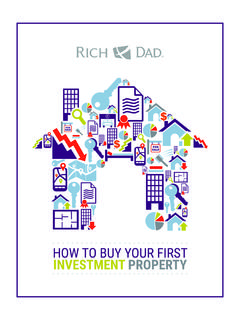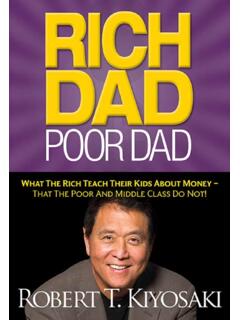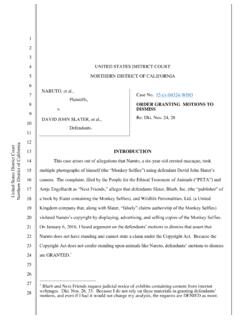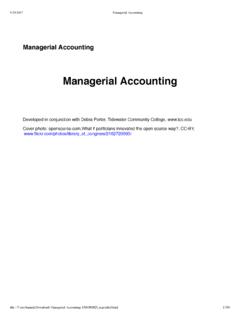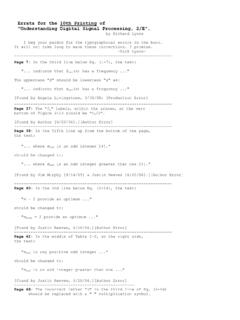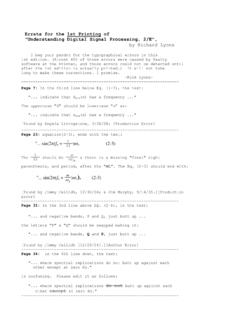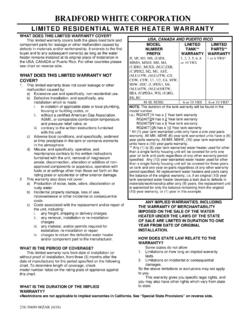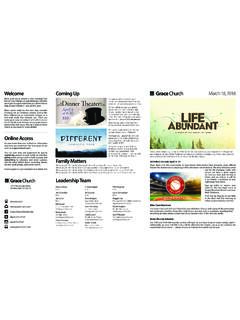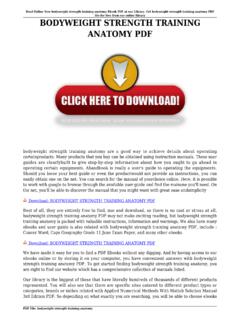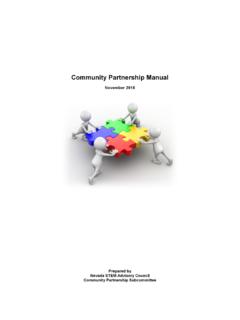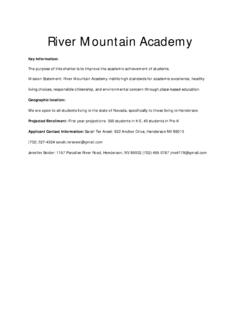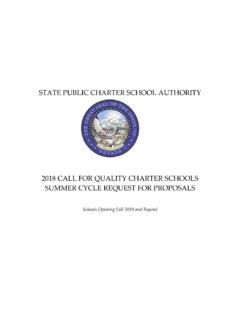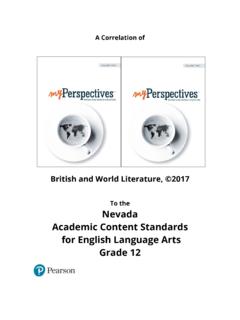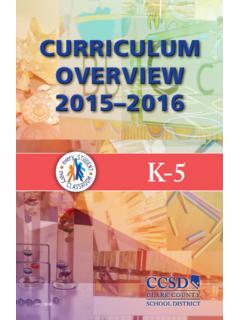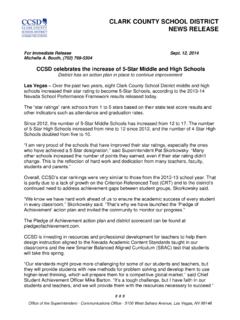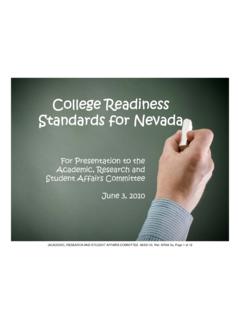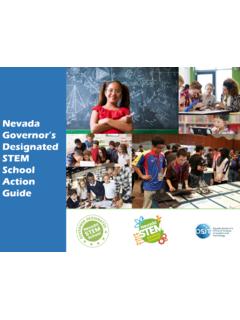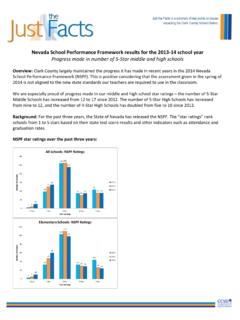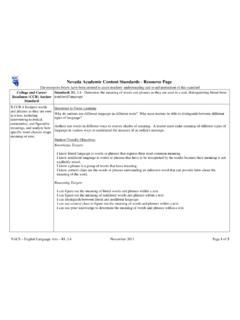Transcription of National Theatre for Children - s3.amazonaws.com
1 Main Crit eria: National Theatre for ChildrenSecondary Crit eria: nevada academic content standards , Common Core State StandardsSubject : Language ArtsGrades: 3, 4, 5 National Theatre for ChildrenWhat YOU can do to conserve energyCommon Core St at e St andardsLanguage Art sGrade 3 - Adopted: 2010 STRAND /DOMAIN standards for LiteratureCATEGORY /CLUSTER Key Ideas and DetailsSTANDARD and answer questions to demonstrate understanding of a text, referring explicitlyto the text as the basis for the stories, including fables, folktales, and myths from diverse cultures;determine the central message, lesson, or moral and explain how it is conveyedthrough key details in the characters in a story ( , their traits, motivations, or feelings) and explainhow their actions contribute to the sequence of /DOMAIN standards for LiteratureCATEGORY /CLUSTER Craft and StructureSTANDARD to parts of stories, dramas, and poems when writing or speaking about a text,using terms such as chapter, scene, and stanza.
2 Describe how each successive partbuilds on earlier /DOMAIN standards for LiteratureCATEGORY /CLUSTER Range of Reading and Level of Text ComplexitySTANDARD the end of the year, read and comprehend literature, including stories, dramas,and poetry, at the high end of the grades 2-3 text complexity band independently /DOMAIN standards for Informational TextCATEGORY /CLUSTER Key Ideas and DetailsSTANDARD and answer questions to demonstrate understanding of a text, referring explicitlyto the text as the basis for the the main idea of a text; recount the key details and explain how theysupport the main the relationship between a series of historical events, scientific ideas , or steps in technical procedures in a text, using language that pertains totime, sequence, and /DOMAIN standards for Informational TextCATEGORY /CLUSTER Craft and StructureSTANDARD the meaning of general academic and domain-specific words and phrasesin a text relevant to a grade 3 topic or subject /DOMAIN standards for Informational TextCATEGORY /CLUSTER Integration of Knowledge and IdeasSTANDARD information gained from illustrations ( , maps, photographs) and the words ina text to demonstrate understanding of the text ( , where, when, why, and how keyevents occur).
3 STRAND /DOMAIN standards for Informational TextCATEGORY /CLUSTER Range of Reading and Level of Text ComplexitySTANDARD the end of the year, read and comprehend informational texts, includinghistory/social studies, science, and technical texts, at the high end of the grades 2-3text complexity band independently and /DOMAIN standards : Foundational SkillsCATEGORY /CLUSTER FluencySTANDARD with sufficient accuracy and fluency to support aRead on-level text with purpose and cUse context to confirm or self-correct word recognition and understanding,rereading as /DOMAIN and Listening StandardsCATEGORY /CLUSTER Comprehension and CollaborationSTANDARD effectively in a range of collaborative discussions (one-on-one, in groups,and teacher-led) with diverse partners on grade 3 topics and texts, building onothers' ideas and expressing their own to discussions prepared, having read or studied required material.
4 Explicitlydraw on that preparation and other information known about the topic to exploreideas under agreed-upon rules for discussions ( , gaining the floor in respectful ways,listening to others with care, speaking one at a time about the topics and texts underdiscussion).EXPECTATION questions to check understanding of information presented, stay on topic, andlink their comments to the remarks of their own ideas and understanding in light of the /DOMAIN and Listening StandardsCATEGORY /CLUSTER Comprehension and CollaborationSTANDARD the main ideas and supporting details of a text read aloud or informationpresented in diverse media and formats, including visually, quantitatively, and /DOMAIN StandardsCATEGORY /CLUSTER Vocabulary Acquisition and UseSTANDARD or clarify the meaning of unknown and multiple-meaning word and phrasesbased on grade 3 reading and content .
5 Choosing flexibly from a range of aUse sentence-level context as a clue to the meaning of a word or /DOMAIN StandardsCATEGORY /CLUSTER Vocabulary Acquisition and UseSTANDARD understanding of word relationships and nuances in word the literal and nonliteral meanings of words and phrases in context ( ,take steps).STRAND /DOMAIN StandardsCATEGORY /CLUSTER Vocabulary Acquisition and UseSTANDARD and use accurately grade-appropriate conversational, general academic , anddomain-specific words and phrases, including those that signal spatial and temporalrelationships ( , After dinner that night we went looking for them).Common Core St at e St andardsLanguage Art sGrade 4 - Adopted: 2010 STRAND /DOMAIN standards for LiteratureCATEGORY /CLUSTER Key Ideas and DetailsSTANDARD to details and examples in a text when explaining what the text says.
6 1and when drawing inferences from the .3 Describe in depth a character, setting, or event in a story or drama, drawing onspecific details in the text ( , a character's thoughts, words, or actions).STRAND /DOMAIN standards for LiteratureCATEGORY /CLUSTER Range of Reading and Level of Text ComplexitySTANDARD .10By the end of the year, read and comprehend literature, including stories, dramas,and poetry, in the grades 4 -5 text complexity band proficiently, with scaffolding asneeded at the high end of the /DOMAIN standards for Informational TextCATEGORY /CLUSTER Key Ideas and DetailsSTANDARD .1 Refer to details and examples in a text when explaining what the text says explicitlyand when drawing inferences from the .2 Determine the main idea of a text and explain how it is supported by key details;summarize the.
7 3 Explain events, procedures, ideas, or concepts in a historical, scientific, or technicaltext, including what happened and why, based on specific information in the /DOMAIN standards for Informational TextCATEGORY /CLUSTER Craft and StructureSTANDARD .4 Determine the meaning of general academic and domain-specific words or phrases ina text relevant to a grade 4 topic or subject /DOMAIN standards for Informational TextCATEGORY /CLUSTER Integration of Knowledge and IdeasSTANDARD .7 Interpret information presented visually, orally, or quantitatively ( , in charts,graphs, diagrams, time lines, animations, or interactive elements on Web pages) andexplain how the information contributes to an understanding of the text in which .8 Explain how an author uses reasons and evidence to support particular points in /DOMAIN standards for Informational TextCATEGORY /CLUSTER Range of Reading and Level of Text ComplexitySTANDARD.
8 10By the end of year, read and comprehend informational texts, including history/socialstudies, science, and technical texts, in the grades 4 -5 text complexity bandproficiently, with scaffolding as needed at the high end of the /DOMAIN standards : Foundational SkillsCATEGORY /CLUSTER FluencySTANDARD .4 Read with sufficient accuracy and fluency to support .4 aRead on-level text with purpose and .4 cUse context to confirm or self-correct word recognition and understanding,rereading as /DOMAIN StandardsCATEGORY /CLUSTER Research to Build and Present KnowledgeSTANDARD .9 Draw evidence from literary or informational texts to support analysis, reflection, .9 aApply grade 4 reading standards to literature ( , ''Describe in depth a character,setting, or event in a story or drama, drawing on specific details in the text [ , acharacter's thoughts, words, or actions].)
9 '').EXPECTATION .9 bApply grade 4 reading standards to informational texts ( , ''Explain how an authoruses reasons and evidence to support particular points in a text'').STRAND /DOMAIN and Listening StandardsCATEGORY /CLUSTER Comprehension and CollaborationSTANDARD .1 Engage effectively in a range of collaborative discussions (one-on-one, in groups,and teacher-led) with diverse partners on grade 4 topics and texts, building onothers' ideas and expressing their own .1aCome to discussions prepared, having read or studied required material; explicitlydraw on that preparation and other information known about the topic to exploreideas under .1bFollow agreed-upon rules for discussions and carry out assigned .1cPose and respond to specific questions to clarify or follow up on information, andmake comments that contribute to the discussion and link to the remarks of /DOMAIN and Listening StandardsCATEGORY /CLUSTER Comprehension and CollaborationSTANDARD.
10 2 Paraphrase portions of a text read aloud or information presented in diverse mediaand formats, including visually, quantitatively, and /DOMAIN and Listening StandardsCATEGORY /CLUSTER Presentation of Knowledge and IdeasSTANDARD .6 Differentiate between contexts that call for formal English ( , presenting ideas)and situations where informal discourse is appropriate ( , small-groupdiscussion); use formal English when appropriate to task and situation. (See grade 4 Language standards 1 on page 28 for specific expectations.)STRAND /DOMAIN StandardsCATEGORY /CLUSTER Knowledge of LanguageSTANDARD .3 Use knowledge of language and its conventions when writing, speaking, reading, .3cDifferentiate between contexts that call for formal English ( , presenting ideas)and situations where informal discourse is appropriate ( , small-groupdiscussion).
